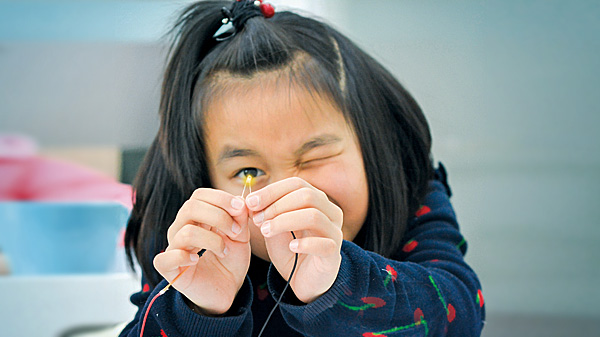While kids in China and Hong Kong have long topped global educational rankings thanks to their ability to parrot amazingly long lists of facts – none of which it has ever been established that they actually understand – there are now signs that new criteria are emerging. New only in the sense of being alien to the existing Asian academic culture, these freshly arrived concepts put a greater emphasis on understanding rather than on rotelearning, and prize creativity above capitulation to group-think.

Put simply, ceaseless chanting is out while interaction is in. Basically – teacher speaks, students listen = bad; students speak, students listen, teacher prompts and guides = good. Interestingly, though, these new teaching styles are not just being embraced or imported as the latest nod to the vagaries of a new generation of Mums and Dads. They are actually being tacitly nodded through at the very highest level, as awareness grows that the workforce of tomorrow needs very different skills to those of its current counterpart.
While this may assuage the mounting concern of certain parents, the cannier custodians of their kids’ futures are also well aware that change is in the air. How, then, to future-proof your offspring without wholly abandoning the high-fact diet of the past? The answer may well be an age-old phenomenon in a new 21st century easy guise – the summer school. High on hands-on experience and student-led learning, the best of these ideally complement the core curriculum of term-time tuition, while instilling just the sort of sensibility sure to be sought out in the future. Below are five summer camps that are seen as best fitting the bill…

Les Elfes International (Verbier, Switzerland)
Back in 1987, Les Elfes International began welcoming children as young as 12 to residential summer camps during summer and winter holidays. Its Swiss watchmaking course, which taught children how to assemble top-end timepieces. This, though, is just one small example of what the school actually offers, with its students having the chance to learn almost any skill, from skiing to Swiss cookery. They also offer intensive English, French, German or Spanish language courses. The academy also prides itself on promoting a can-do attitude among attendees, giving them the confidence to problem-solve unaided and unprompted.
Bermotech (London, UK)
This is one summer camp that could not be more up to- the-minute, with its avowed mission being to transform coming-of-age coders into tomorrow’s tech savants. Bermotech has evolved into one of the most in-demand enablers of digital development for nine- to 17-year-olds. In keeping with the current concentration on career cultivation, it also offers education in all the entrepreneurial essentials across the same age groups.

The Boston Leadership Institute (Massachusetts, USA)
Open to 13- to 18-year-olds, the institute’s science, technology, engineering and mathematics (STEM) based summer courses were referred to by one graduate as an “out-of-this-world experience”. Among the options on offer are biotechnology, marine biology, robotics and even veterinary science. One reason that its courses are seen as quite so revolutionary is that they use research and experiments as core teaching strategies, meaning that the next big breakthrough in biotech could come from a far-from-home 14-year-old.
The American Institute for Foreign Study (London, UK)
The American Institute‘s most notable manifestation is its much-admired Shakespeare Summer Camp, which takes place within the hallowed halls of London’s Globe Theatre, a note-perfect re-creation of the venue that premiered many of the Bard’s most-admired masterworks. A pretty much best-practice example of how to fuse classroom learning with real-time experiential education, it’s no wonder that the institute is regularly cited as offering some of the very finest international residential courses parental payments can secure.

Camp Asia (Singapore)
Singapore is seen as taking something of a lead when it comes to summer break educational sessions. While many of the options on offer from Camp Asia are hugely popular, it’s the wide range of sporting study within its repertoire that are seen as the jewels in its undoubted crown. According to its own publicity materials – as well as to many parental testimonials – much of its success is down to the notoriously high calibre of its staff.
Indeed, as Exhibit A, its Director of Football – Igor Ferreira – has played football professionally in Brazil, Spain, Sweden, Switzerland, Singapore and Australia, while its Head of Swimming – Darren Gum – has coached no less than 30 Australian athletes to gold medal greatness. With such grounded and well-rounded professionals on its books, it’s actually a little hard to dispute Camp Asia’s claims of true greatness.
Text: Alice Duncan



